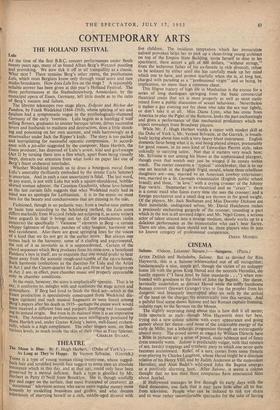THEATRE
The Moon is Blue. By F. Hugh Herbert. (Duke of York's.) As Long as They're Happy. By Vernon Sylvaine. (Garrick.) THERE is a type of young woman rising twenty-one, whose tugged- back hair and scrubbed boyish face suggest to some men an absolute innocence which in this day, and at that age, could only have been Preserved by a mental deficient. Such a type is glorified by Mr. Herbert in Patty O'Neill from Brooklyn. She is, though wistfully gay and eager on the surface, that most frustrated of creatures: an occasional" television actress who earns more regular money more honestly by modelling brassieres and girdles, and who dreams relentlessly of marrying herself to a rich, middle-aged divorce with
five children. The insidious temptation which her immaculate naivete provokes helps her to pick up a clean-living young architect on top of the Empire State Building, invite herself to dine in his apartment, there accept a gift of 600 dollars, "without strings," from the lecherous father of his ex-fiancée (a rich divorce), refuse to be seduced by either until she has carefully made up her mind which one to have, and protest tearfully when she is, at long last, charged with parading as a "professional virgin" and so being, by implication, no more than a common cheat.
This filigree tracery of high life in Manhattan is the excuse for a series of long duologues springing from the basic commercial theatrical credo that wit is most properly as well as most easily mined from a public discussion of sexual behaviour. Nevertheless it makes a gay evening out for those who take the sex war lightly, or don't take it at all., Miss Diana Lynn, who has come from America to play the Piglet of the Remove, looks the part enchantingly and gives a performance of that mechanical proficiency which we expect nowadays from Broadway players. While Mr. F. Hugh Herbert wields a rapier with modest skill at the Duke of York's, Mr. Vernon Sylvaine, at the Garrick, is breath- lessly laying about him with a very heavy blunt instrument. English domestic farce being what it is, and being played always, presumably for good reason, in its own kind of Edwardian Pierrot style, takes unkindly to carrying satire. Not that it matters very much here: Mr. Sylvaine is not aiming his blows at the sophisticated playgoer, though even that wretch may just be winged if he comes within reach. The matter concerns a "typical" stockbroker, that is to say one set bearish in the English frigid mould, whose three rebellious daughters are—one, married to an American cowboy entertainer; two, married to a St. Germain existentialist (English public school brand); and three, "in love" with a crying crooner of the Johnny Ray variety. Stepmother is ex-theatrical and so "crazy": there is a comic maid who faints every time she sees the crooner; and a foreign psychiatrist and a small dog are thrown in for good weight. Of the players, Mr. Jack Buchanan and Miss Dorothy Dickson are their inimitable, undisguised selves; Mr. David Hutcheson makes a preciously enchanting gargoyle of the crooner, rounding a part which in the text is all serrated edges; and Mr. Nigel Green, a serious actor of talent strayed into a strange medium, slowly works up to a delicious performance as the existentialist who can't bear Sartre. There are also, and there should not be, three players who fit into no known category of professional competence.
DEREK MONSEY.


























 Previous page
Previous page